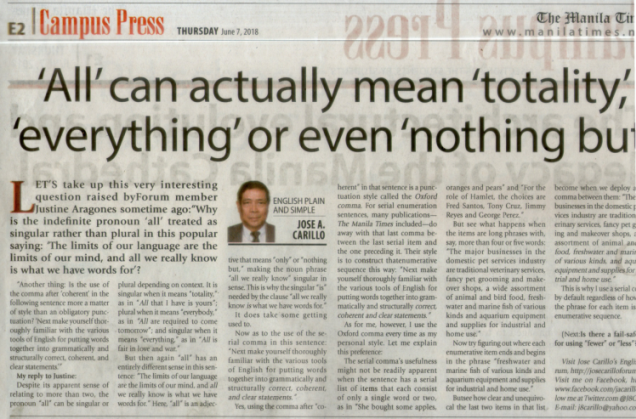Let’s take up this very interesting question raised by Forum member Justine Aragones sometime ago: “Why is the indefinite pronoun ‘all’ treated as singular rather than plural in this popular saying: ‘The limits of our language are the limits of our mind, and all we really know is what we have words for’?
“Another thing: Is the use of the comma after ‘coherent’ in the following sentence more a matter of style than an obligatory punctuation? ‘Next make yourself thoroughly familiar with the various tools of English for putting words together into grammatically and structurally correct,
coherent, and clear statements.’”
My reply to Justine:Despite its apparent sense of relating to more than two, the pronoun “all” can be singular or plural depending on context. It is singular when it means “totality,” as in “All that I have is yours”; plural when it means “everybody,” as in “
All are required to come tomorrow”; and singular when it means “everything,” as in “
All is fair in love and war.”
IMAGE CREDIT: WWW.SLIDESERVE.COMUNLIKE “MANY,” “SEVERAL,” “SOME,” AND “FEW” THAT ARE PLURAL,
THE INDEFINITE PRONOUN “ALL” CAN BE PLURAL OR SINGULAR DEPENDING ON CONTEXT
But then again “all” has an entirely different sense in this sentence: “The limits of our language are the limits of our mind, and
all we really know is what we have words for.” Here, “all” is an adjective that means “only” or “nothing but,” making the noun phrase “all we really know” singular in sense. This is why the singular “is” needed by the clause “all we really know is what we have words for.”
It does take some getting used to.
Now as to the use of the
serial comma in this sentence: “Next make yourself thoroughly familiar with the various tools of English for putting words together
into grammatically and structurally correct, coherent, and clear statements.”
IMAGE CREDIT: ONLINESCHOOLS.COMYes, using the comma after “coherent” in that sentence is a punctuation style called
the Oxford comma. For serial enumeration sentences, many publications—
The Manila Times included—do away with that last comma between the last serial item and the one preceding it. Their style is to construct that enumerative sequence this way: “Next make yourself thoroughly familiar with the various tools of English for putting words together into grammatically and structurally
correct, coherent and clear statements.”
As for me, however, I use the Oxford comma every time as my personal style. Let me explain this preference:
The serial comma’s usefulness might not be readily apparent when the sentence has a serial list of items that each consist of only a single word or two, as in “She bought some apples, oranges and pears” and “For the role of Hamlet, the choices are Fred Santos, Tony Cruz, Jimmy Reyes and George Perez.”
But see what happens when the items are long phrases with, say, more than four or five words: “The major businesses in the domestic pet services industry are traditional veterinary services, fancy pet grooming and makeover shops, a wide assortment of animal and bird food, freshwater and marine fish of various kinds and aquarium equipment and supplies for industrial and home use.”
Now try figuring out where each enumerative item ends and begins in the phrase “freshwater and marine fish of various kinds and aquarium equipment and supplies for industrial and home use.”
But see how clear and unequivocal the last two items in that list become when we deploy a serial comma between them: “The major businesses in the domestic pet services industry are traditional veterinary services, fancy pet grooming and makeover shops,
a wide assortment of animal and bird food, freshwater and marine fish of various kinds, and aquarium equipment and supplies for industrial and home use.”
IMAGE CREDIT: GRAMMARLY.COMGET THE DRIFT WHY THE MISSING OXFORD COMMA AFTER THE WORD
“SUPERMAN” CAN MAKE ALL THE DIFFERENCE?
This is why I use a serial comma by default regardless of how long the phrase for each item is in an enumerative sequence.
 This essay, 1095th of the series, appeared in the column “English Plain and Simple” by Jose A. Carillo in the Campus Press section of the June 7, 2018 issue (print edition only) of
This essay, 1095th of the series, appeared in the column “English Plain and Simple” by Jose A. Carillo in the Campus Press section of the June 7, 2018 issue (print edition only) of The Manila Times
, © 2018 by the Manila Times Publishing Corp. All rights reserved.(Next:
Is there a fail-safe rule for using “fewer” or “less”?) June 14, 2018